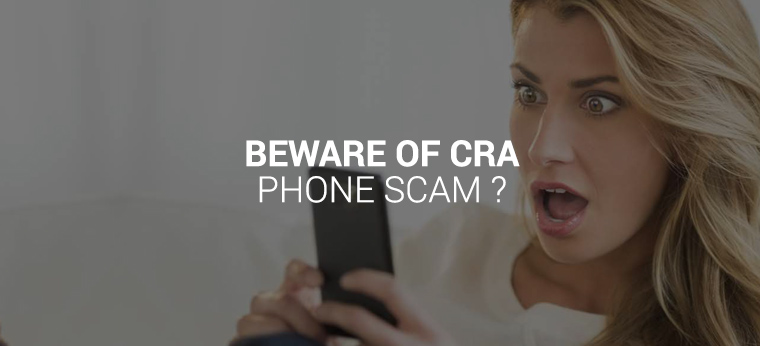
With the rise in technology, it’s often even easier for thieves to try to scam unsuspecting persons. The Canada Revenue Agency (CRA) is warning Canadians about scammers that call and try to impersonate official agents as a way to extort money. Even those who are aware of the scams can be caught up when they receive a phone call or an email that seems legitimate and may become a victim of CRA fraud.
It’s important for everyone to understand how these scams work, why they work, and how to avoid becoming a victim of CRA fraud.
How These Types of Scams Work
Most of the time, these scams start with a phone call or email claiming to be from an official source. They’ll typically tell the person they have been audited and owe taxes or that they owe back taxes from past years that need to be paid immediately.
They may ask for personal information pretending to ensure they’re talking to the correct person or they may insist the person obtain Western Union, Money Gram, prepaid debit cards or a bank transfer to send money immediately. They will try to make it sound urgent and threaten court dates, jail time or deportation if the presumed taxes are not paid as an attempt to scare the person into paying before they stop to think about the situation.
What a Person Can Do to Protect Themselves
A person who is contacted by email, phone, or any other means from a company should never hand over personal information or money. They should, instead, ask for a name and case number and then alert the person they’re talking to that they’re going to contact the Government of Canada for more information. They can then contact the government, their bank, or the other financial institution that was claiming to call them to be sure there is a legitimate reason for the call.
Often, they’ll find the place that was supposedly contacting them has no record of the call or of any financial issues that need to be cleared up. This shows the person is was simply a scam and they were able to avoid it by not giving out any information without confirming who they were actually speaking with.
Red Flags of a Scam
The following are just a few of the red flags a person might encounter when they are on the phone or reading an email from someone who is attempting to scam them out of money. The CRA will never do any of these.
- Request a prepaid debit card, Money Gram, Western Union or bank transfer of money immediately to avoid issues like jail time or deportation
- Ask for information about the person’s passport, license, or other important documents
- Request personal information be left on an answering machine or given to the caller, especially if the CRA should already have the information on file
A person who is well informed on how to handle communications that seem like they come from an official source is better equipped to handle these types of scams and to avoid becoming a victim. Always be careful when receiving communication via phone or email and be sure to verify the source before giving out any personal information, especially information for bank accounts or other ways the thief can steal money. This way, you can protect yourself and avoid falling victim to a scam.
